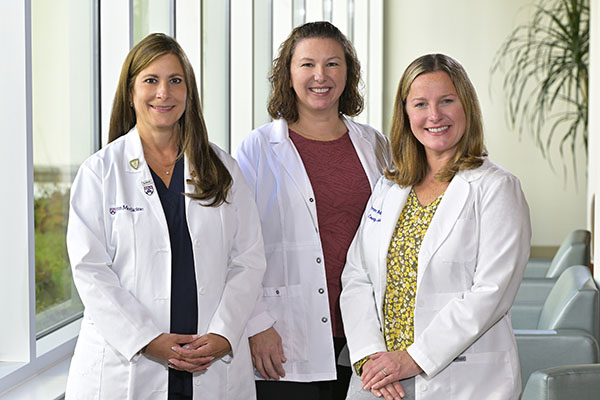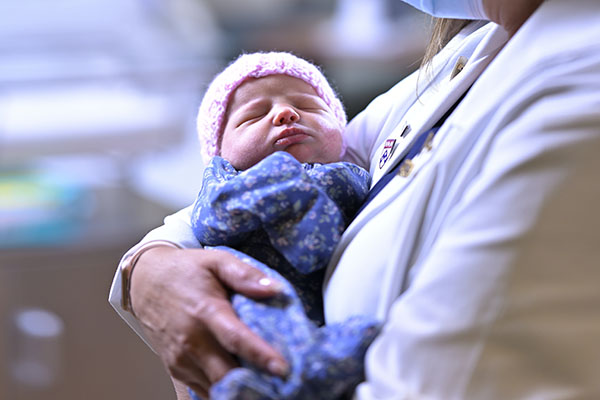
Over the last year, birth rates at Chester County Hospital jumped more than 10 percent. While a pandemic rebound explains part of it, the hospital’s comprehensive – and individualistic – care is also a major factor.
Many unusual things happened in the wake of the first wave of COVID. Among them, the birth rate rose across the United States after trending downward for 15 years. In July, the National Center for Health Statistics (NCHS) announced that the one percent rise in US births in 2021 "was the first increase since 2014".
There was a caveat: The US birth rate fell to a record low in 2020, the first year of the COVID pandemic. The first few months saw soaring unemployment, stay-at-home orders and widespread uncertainty, which seemed to force would-be parents to reconsider their plans. Although, that period was short-lived. As restrictions eased and the economy slowly recovered, the US birth rate followed a similar trajectory, increasing four percent over the last six months of 2021, according to the NCHS.
This rebound effect explains a one percent and even a four percent gain in the birth rate, but not a more than 10 percent increase, which is what Chester County Hospital reported. In fiscal year 2021, 2,921 babies were delivered at Chester County Hospital. (The fiscal year runs from July 1 through June 30.) In fiscal year 2022, that number jumped to 3,231.
Katie Luzi Costantini, MSN, RNC-MNN, Director of Maternal Child Services for Chester County Hospital, points to the abundance of new residential construction across the region in recent years and suspects it could have fueled a more substantial rebound effect locally. According to the US Census Bureau, the county’s population increased by seven percent between 2010 and 2020.
Amy Latyak, BSN, RN, CCE, CBC, the hospital's Childbirth Education Program Coordinator, attributes part of the rise to a growing awareness of the hospital's elite reputation. In August, Chester County Hospital was one of 145 hospitals nationwide and one of three in Pennsylvania to be included in Healthgrades' list of National Leaders in Obstetrics & Gynecology. The hospital was also recently ranked 10th in the Philadelphia region and 17th in the state by US News & World Report.
Latyak oversees the hospital's Mother Baby Facebook Group, a forum with more than 2,800 members where expecting parents can pose questions to nurses and specialists at Chester County Hospital. There's also a wealth of posts by new parents who happily share the intimate details of their positive delivery experiences at the hospital. "I think that helps people solidify their decision to deliver here," Latyak says.
We recently asked mothers in the group who delivered a baby at Chester County Hospital during fiscal year 2022 to share some impressions of their experience. Kelly Gabe, who had her daughter, Avery, on May 15, wrote: "Congratulations on your record year. The excellent care provided by your staff is even more remarkable in that light. We could not have had a better birth journey. A huge thank you to your staff."
Kelsey Fraim delivered her son, Owen, on July 22, 2021. "We had such an amazing experience," she wrote. "We're forever grateful for our care team for keeping us all happy and well throughout our stay and even after."
Meeting Parents Where They Are

Pictured Left to Right: Labor and Deliverey Clinical Manager Annette Pappas, MSN, RNC-OB; Childbirth Education Program Coordinator, Amy Latyak, BSN, RN, CCE, CBC; and Katie Constantini, MSN, RNC-MNN, Director of Maternal Child Services.
When the time comes for an expecting mother to deliver, she will be admitted to Chester County Hospital's Labor and Delivery Unit, where she'll remain until she has her baby. Soon after, they'll be moved together to a different area of the floor, the Mother and Baby Pavilion, which comprises 24 private patient rooms. But a mother's delivery experience at the hospital typically begins well before those days.
The Childbirth Education Program encompasses nine in-person classes at the hospital and virtually through Zoom. The subject matter spans the full spectrum of an expecting parent's potential concerns: preparation for the birth, breastfeeding basics, newborn care, and postpartum adjustments. There are also virtual tours -- in English and Spanish -- of the Labor and Delivery Unit, newborn nursery, Mother and Baby Pavilion, and Neonatal Intensive Care Unit. A fee is charged for all classes. Financial assistance is available.
A series of independent study-style e-classes, which cover many of the same subjects, is also offered. To help new parents adapt to life with their newborn in real time, Latyak helped develop the Parent Wellness Network, which includes resources for lactation counseling and perinatal mood disorders, as well as three free support groups: one for breastfeeding mothers; Moms Supporting Moms, where a maternal mental health specialist moderates open-ended discussions; and a group for new dads that's led by an obstetrician and a physical therapist, both fathers themselves.
The goal of the classes and support groups, Latyak says, is to try to meet parents where they are at every turn.
Compassion Runs Deep

Labor and Delivery Clinical Manager Annette Pappas, MSN, RNC-OB, greets a new arrival!
An expecting mother can arrive at Chester County Hospital's Labor and Delivery Unit for various reasons, says Annette Pappas, MSN, RNC-OB, the unit's Clinical Manager.
"Some are admitted for induction, others because there was a complication with their pregnancy," she says. "And some come in on their own."
Nurses and physicians from Labor and Delivery and Mother and Baby meet daily to discuss each patient. This dialogue involves treatment plans, as well as personal needs and wants.
"We get to know each patient's story because we want to provide the best experience for our patients while they're under our care," Pappas says. "If, for example, a patient asks for minimal intervention, we have several ways we can support their choice."
For other mothers, the delivery is the final phase of a closely monitored, high-risk pregnancy. Jennifer Barron, 43, was admitted to Labor and Delivery last December at full term, a feat she credits to Penn Medicine’s Maternal-Fetal Medicine Division and her obstetricians, William F. Brazerol, MD, and Justin A. Sloane, MD, FACOG, FCPP.
On Dec. 3, Barron delivered her son, Andrew Vonne Barron Matchett, her "one and only child” as she describes him. In the Mother Baby Facebook Group, she wrote, "There are no words that can explain how wonderful the staff at Chester County Hospital is, from the delivery to postpartum care. I will forever cherish them."
Amy Bergmaier echoed the sentiment. She was diagnosed with cholestasis of pregnancy, a liver condition that occurs late in pregnancy. It can cause severe itching and, potentially, complications with the developing baby. As a result, she was scheduled to deliver her son, Noah, through C-section at 37 weeks. "All of my nurses were just wonderful," she wrote.
Compassion runs deep among nurses and physicians, Costantini says.
"Every Maternal Child team member cares for our patients like family members. A big part of that recognizes their individuality," she says. "The art of what we do is trying better to understand our patients' different perspectives and philosophies."
Costantini speaks from the experience of both sides. She was appointed Director of Maternal Child Services in August. Before that, she was a maternal child nurse at the hospital. And during the early, uncertain days of the pandemic, she was an anxious mom about to give birth to her third child.
She delivered her first two children at the Hospital at the University of Pennsylvania, where she was a maternal child nurse at the time. For her third delivery, she never considered anywhere else but Chester County Hospital.
"The decision was very easy," she says. "I felt like I had advocates all around me looking out for my best interest. And I knew that this was where I would receive the highest quality care."
"As we left the hospital, my husband was in awe of how personal my care was," Costantini adds. "But all around us, women and their partners were receiving the same kind of attention. That's what makes Chester County Hospital special."